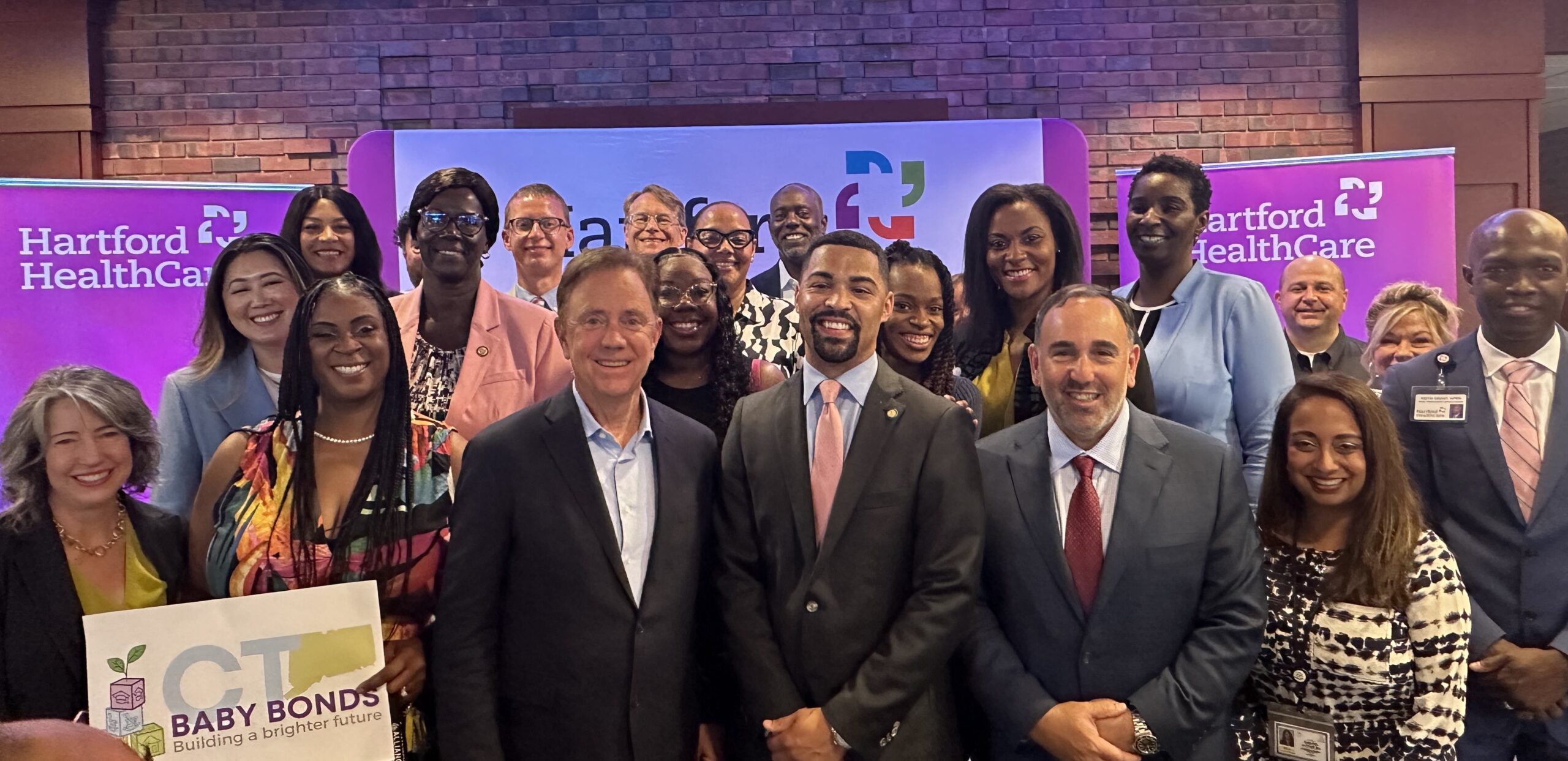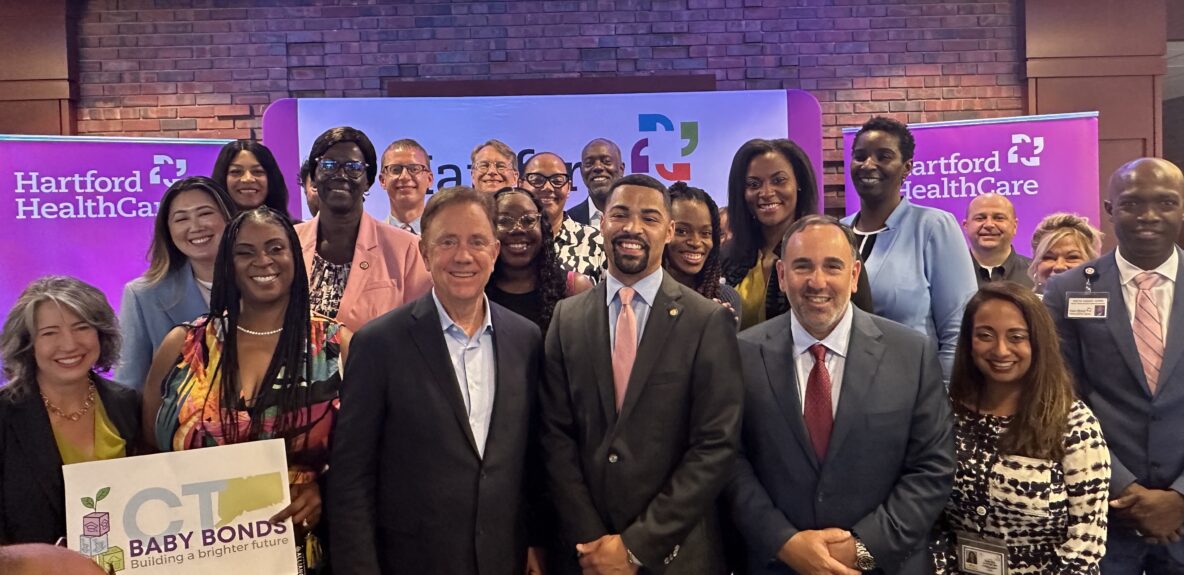
By Emily Byrne | November 16, 2023
Baby Bonds are an increasingly popular bipartisan government policy in which every child born into poverty receives a publicly funded trust account at birth. This “start-up capital” allows young adults to access education, home ownership, and entrepreneurship, enabling them to build wealth and lead lives that are hopeful, fulfilling, productive, prosperous, and self-directed. Follow our Baby Blogs series to learn about the vision, politics, and people behind Baby Bonds and their transformative impact on the lives of young people, their families, communities, and our economy.
Emily Byrne is the executive director of Connecticut Voices for Children, a statewide “think and do” tank with a strategic aim toward economic justice. She has extensive experience in developing human-centered policies and programs, as well as driving effective advocacy strategies in service of progressive change. Connecticut Voices for Children was a key community partner in helping win the Connecticut Baby Bonds policy. In this installment of Baby Blogs, Byrne shares her thoughts on the promise and power of Baby Bonds for low-income, vulnerable families.
Key Takeaways:
- Big, bold policies sometimes require coloring outside of the lines of the “possible,” and beckon audacious leadership to the table.
- Just because the typical lawmaking process is usually a well worn trail doesn’t mean that’s the best way to make progress on complicated social and economic issues.
- Leadership transitions can put good ideas and policies at risk, but if approached with “hubris and humility,” they can create conditions for success—and durability that can outlive any one administration.
It is often said that politicians are reactionary. They act based on the roar of the constituencies that elect them, coupled with the rare windows of opportunity. It’s why movements are critical. Although once in a long while a brave politician will lead the advocacy field, this isn’t how most policies become law. Instead, ideas are birthed out of community necessity and think tanks. Media of all forms create the space for ideas to germinate. Time allows for those ideas to dissipate or grow. The ideas that amass more community voices are debated and polled for popularity. The popular ideas receive political support by electeds, and either survive a contentious vote or die to be resurrected years later (sometimes in their original form but likely altered for broad consumership) because the need persists.
This can—as one might imagine—take years and often decades, and it’s the people for whom these policies would help the most who are left behind during this time. It’s one of the reasons why generational poverty exists in America today. But sometimes big, bold ideas—ideas that dramatically shift our existing systems and structures—skip one or two or even several of the slow steps that make up our process of lawmaking. When this happens, it’s right to ask, “How and why?” The lessons learned can inform future collective actions so that the progress we seek can occur more quickly the next time. CT Baby Bonds offers one such lesson; specifically, in the audacious leadership that stewarded the policy.
My organization, Connecticut Voices for Children, envisions a state that creates opportunity for everyone, not just the lucky and privileged few. To reach this better world, we work toward state and national systems changes that advance economic justice. Our focus is on the intersectional issues that promote family economic security and income and wealth equity. As researchers and advocates we know that we need to be impatient about injustice but patient about strategy. So, when H.B. 6659: An Act Concerning the Establishment of the Connecticut Baby Bond Trust was raised in January of 2021, we were thrilled and, honestly, a bit surprised. There are some that knew we had arrangements to publish a report on state-level Baby Bonds in 2022 as an introductory concept. However, fast-tracking the socialization of this policy straight to legislation was beyond our expectations. All of this is to say, we were ready but was everyone else?
To our astonishment, CT Baby Bonds was enacted, making history as the first policy of its kind to pass into law. A public campaign to inform and prepare parents for their children’s accounts as well as spread the good word was launched. Things were going well. Then, as you may know, the very next year, the funding stalled. Politics was politicking. What was a bright light of hope for many families in Connecticut was dimmed. Those leading the 2021 efforts understood that a permanent delay was a real possibility. Fortunately, while not a straight line to victory, CT Baby Bonds became fully funded this year and the first babies to receive these endowments were born on July 1, 2023.
We make dozens of choices each day, most without intentionality or consequence. Although some choices are ones that put our position, status, livelihood, and even life on the line, I’m not sure that anyone fully grasps the magnitude of their choices until afterwards. The stakes that range from employment to existence, of course, are not the same. But it’s the theoretical “risking it all” that’s worth unpacking. To be clear, there were several leaders that risked a lot to pave the way for this to happen. While the collective choices culminated at the end, the decisions made by former Treasurer Shawn Wooden and current Treasurer Erick Russell were the riskiest, and paramount to the policy becoming reality.
For Treasurer Wooden’s part, the choice to lift-up the policy in the first place; partner with aligned policymakers, community organizations, and tour the country to build an advocacy tent that could hold many stakeholders; understand the conditions for the policy to succeed; and ultimately entrust the continuation of the feeding and care of that policy to another, all took guts (and, in the end, without taking the glory). For Treasurer Russell’s part, the choice to commit to another’s policy without an ability to claim its origin, engage and double-down on the preexisting advocacy infrastructure, assume responsibility for the continued nurturing of that policy, and ensure the program is established in a way for the next officeholder to shepherd the policy with fidelity highlights a freedom of pride, and with the pageantry of history-making.
I’ve heard it said that the people who “risk it all” are either those that have nothing to lose or those that have everything to lose. I think this is true. I’d also argue that the people who “risk it all” are those that believe the impossible can be possible, and those that believe the impossible is only possible with them. Sometimes, “We are the ones we’ve been waiting for,” as the poet June Jordan has written. Sometimes we’re not. But in the case of CT Baby Bonds, these two men had the audacity to believe that transformational change requires leaders willing to take big, bold actions. They had the hubris and humility necessary to be the torchbearers, and it’s one of the most important takeaways from the Connecticut story.
If you missed previous installments of our Baby Blogs series, read them here.
To share feedback on this blog, or for questions about Baby Bonds, email David Radcliffe at radclifd@newschool.edu.
To learn more, explore our Baby Bonds resources.

